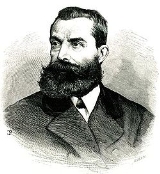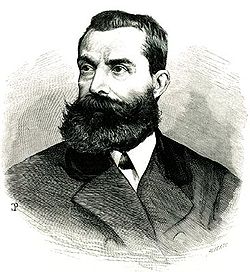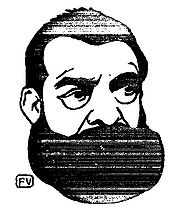
João de Deus
Encyclopedia

Portugal
Portugal , officially the Portuguese Republic is a country situated in southwestern Europe on the Iberian Peninsula. Portugal is the westernmost country of Europe, and is bordered by the Atlantic Ocean to the West and South and by Spain to the North and East. The Atlantic archipelagos of the...
poet of his generation, was born in Silves, São Bartolomeu de Messines
São Bartolomeu de Messines
São Bartolomeu de Messines is a Portuguese Parish in the Municipality of Silves. It has an area of 246.41 km² and a population of 8,491 with a population density of 34.5 hab/km²....
, in the province of Algarve, son of Pedro José Ramos (son of José dos Ramos and wife Joaquina Maria) and wife Isabel Gertrudes Martins (daughter of Manuel Martins and wife Gertrudes Angélica). Matriculating in the faculty of law at the University of Coimbra, he did not proceed to his degree but settled in the city, dedicating himself wholly to the composition of verses, which circulated among professors and undergraduates in manuscript copies.
In the volume of his art, as in the conduct of life, he practised a rigorous self-control. He printed nothing previous to 1855, and the first of his poems to appear in a separate form was A Lata, in 1860. In 1862 he left Coimbra
Coimbra
Coimbra is a city in the municipality of Coimbra in Portugal. Although it served as the nation's capital during the High Middle Ages, it is better-known for its university, the University of Coimbra, which is one of the oldest in Europe and the oldest academic institution in the...
for Beja
Beja (Portugal)
Beja is a city in the Beja Municipality in the Alentejo region, Portugal. The municipality has a total area of 1,147.1 km² and a total population of 34,970 inhabitants. The city proper has a population of 21,658....
, where he was appointed editor of O Bejense, the chief newspaper in the province of Alentejo, and four years later he edited the Folha do Sul. As the pungent satirical
Satire
Satire is primarily a literary genre or form, although in practice it can also be found in the graphic and performing arts. In satire, vices, follies, abuses, and shortcomings are held up to ridicule, ideally with the intent of shaming individuals, and society itself, into improvement...
verses entitled Eleições prove, he was not an ardent politician, and, though he was returned as deputy for the constituency of Silves on April 5, 1868, he acted independently of all political parties and when general elections were called the following year, he did not seek renewal of his mandate. The renunciation implied in the act, which cut him off from all advancement, is in accord with nearly all that is known of his lofty character.
In the year of his election as deputy, his friend José António Garcia Blanco collected from local journals the series of poems, Flores do campo, which is supplemented by the Ramo de flores (1869). This is João de Deus' masterpiece.
Pires de Marmelada (1869) is an improvisation of no great merit. The four theatrical pieces -- Amemos o nosso próximo, Ser apresentado, Ensaio de Casamento, and A viúva inconsolável -- are prose translations from Méry
Méry
Méry is a commune in the Savoie department in the Rhône-Alpes region in south-eastern France....
, cleverly done, but not worth the doing. Horácio e Lydia (1872), a translation from Pierre de Ronsard
Pierre de Ronsard
Pierre de Ronsard was a French poet and "prince of poets" .-Early life:...
, is a good example of artifice in manipulating that dangerously monotonous measure, the Portuguese couplet.
He married Guilhermina das Mercês Battaglia, born in Lisbon
Lisbon
Lisbon is the capital city and largest city of Portugal with a population of 545,245 within its administrative limits on a land area of . The urban area of Lisbon extends beyond the administrative city limits with a population of 3 million on an area of , making it the 9th most populous urban...
on July 12, 1849, daughter of António Battaglia, of Italian descent, and wife Maria Madalena Soares, and had two sons: José do Espírito Santo Battaglia Ramos (Lisbon
Lisbon
Lisbon is the capital city and largest city of Portugal with a population of 545,245 within its administrative limits on a land area of . The urban area of Lisbon extends beyond the administrative city limits with a population of 3 million on an area of , making it the 9th most populous urban...
, April 4, 1875 – Lisbon
Lisbon
Lisbon is the capital city and largest city of Portugal with a population of 545,245 within its administrative limits on a land area of . The urban area of Lisbon extends beyond the administrative city limits with a population of 3 million on an area of , making it the 9th most populous urban...
, April 20, 1943), who was created 1st Viscount
Viscount
A viscount or viscountess is a member of the European nobility whose comital title ranks usually, as in the British peerage, above a baron, below an earl or a count .-Etymology:...
of São Bartolomeu de Messines
São Bartolomeu de Messines
São Bartolomeu de Messines is a Portuguese Parish in the Municipality of Silves. It has an area of 246.41 km² and a population of 8,491 with a population density of 34.5 hab/km²....
, who married Spanish
Spanish people
The Spanish are citizens of the Kingdom of Spain. Within Spain, there are also a number of vigorous nationalisms and regionalisms, reflecting the country's complex history....
María del Carmen Gómez y Sánchez (Lisbon
Lisbon
Lisbon is the capital city and largest city of Portugal with a population of 545,245 within its administrative limits on a land area of . The urban area of Lisbon extends beyond the administrative city limits with a population of 3 million on an area of , making it the 9th most populous urban...
, February 18, 1882 – Lisbon
Lisbon
Lisbon is the capital city and largest city of Portugal with a population of 545,245 within its administrative limits on a land area of . The urban area of Lisbon extends beyond the administrative city limits with a population of 3 million on an area of , making it the 9th most populous urban...
, October, 1919) and had issue; and João de Deus Ramos, who married Carmen Syder, of paternal English
English people
The English are a nation and ethnic group native to England, who speak English. The English identity is of early mediaeval origin, when they were known in Old English as the Anglecynn. England is now a country of the United Kingdom, and the majority of English people in England are British Citizens...
descent, and had female issue.
As an indication of a strong spiritual reaction three prose fragments (1873) Anna, Mãe de Maria, A Virgem Maria and A Mulher do Levita de Ephraim translated from Darboy's Femmes de la Bible, are full of significance. The Folhas soltas (1876) is a collection of verse in the manner of Flores do campo, brilliantly effective and exquisitely refined.
Within the next few years the writer turned his attention to educational problems, and in his Cartilha maternal (1876) first expressed the conclusions to which his study of Pestalozzi
Johann Heinrich Pestalozzi
Johann Heinrich Pestalozzi was a Swiss pedagogue and educational reformer who exemplified Romanticism in his approach....
and Fröbel had led him. This patriotic, pedagogical apostolate was a misfortune for Portuguese literature; his educational mission absorbed João de Deus completely, and is responsible for numerous controversial letters, for a translation of Theodore-Henri Barraus' treatise, Des devoirs des enfants envers leurs parents, for a prosodic dictionary, and for many other publications of no literary value. A copy of verses in António Vieira's Grinalda de Maria (1877), the Loas da Virgem (1878) and the Provérbios de Salomão are evidence of a complete return to orthodoxy during the poet's last years.
By a lamentable error of judgment, some worthless pornographic verses entitled Cryptinas have been inserted in the completest edition of João de Deus' poems -- Campo de Flores (Lisbon
Lisbon
Lisbon is the capital city and largest city of Portugal with a population of 545,245 within its administrative limits on a land area of . The urban area of Lisbon extends beyond the administrative city limits with a population of 3 million on an area of , making it the 9th most populous urban...
, 1893). He died in Lisbon
Lisbon
Lisbon is the capital city and largest city of Portugal with a population of 545,245 within its administrative limits on a land area of . The urban area of Lisbon extends beyond the administrative city limits with a population of 3 million on an area of , making it the 9th most populous urban...
on January 11, 1896, was accorded a public funeral and was buried in the National Pantheon, the Jeronymite church at Belém, where repose the remains of Camões
Luís de Camões
Luís Vaz de Camões is considered Portugal's and the Portuguese language's greatest poet. His mastery of verse has been compared to that of Shakespeare, Vondel, Homer, Virgil and Dante. He wrote a considerable amount of lyrical poetry and drama but is best remembered for his epic work Os Lusíadas...
. His remains were later moved to the Church of Santa Engrácia, the new National Pantheon. His scattered minor prose writings and correspondence have been posthumously published by Teófilo Braga
Teófilo Braga
Joaquim Teófilo Fernandes Braga ]] 24 February 1843 – 28 January 1924) was a Portuguese writer, playwright, politician and the leader of the Republican Provisional Government after the abdication of King Manuel II, as well as the second elected President of the First Portuguese Republic, following...
(Lisbon, 1898).

Public opinion
Public opinion is the aggregate of individual attitudes or beliefs held by the adult population. Public opinion can also be defined as the complex collection of opinions of many different people and the sum of all their views....
and more deliberately careless of personal fame. He is not responsible for any single edition of his poems, which were put together by pious but ill-informed enthusiasts, who ascribed to him verses that he had not written; he kept no copies of his compositions, seldom troubled to write them himself, and was content for the most part to dictate them to others. He has no great intellectual force, no philosophic doctrine, is limited in theme as in outlook, is curiously uncertain in his touch, often marring a fine poem with a slovenly rhyme or with a misplaced accent; and, on the only occasion when he was induced to revise a set of proofs, his alterations were nearly all for the worse. And yet, though he never appealed to the patriotic spirit, though he wrote nothing at all comparable in force or majesty to the restrained splendour of Os Lusíadas, the popular instinct which links his name with that of his great predecessor is eminently just. For Camões was his model; not the Camões of the epic, but the Camões of the lyrics and the sonnet
Sonnet
A sonnet is one of several forms of poetry that originate in Europe, mainly Provence and Italy. A sonnet commonly has 14 lines. The term "sonnet" derives from the Occitan word sonet and the Italian word sonetto, both meaning "little song" or "little sound"...
s, where the passion of tenderness finds its supreme utterance.
Braga has noted five stages of development in João de Deus' artistic life: the imitative, the idyllic, the lyric, the pessimistic and the devout phases. Under each of these divisions is included much that is of extreme interest, especially to contemporaries who have passed through the same succession of emotional experience, and it is highly probable that Caturras and Gaspar, pieces as witty as anything in Bocage but free from Bocage's coarse impiety, will always interest literary students. But it is as the singer of love that João de Deus will delight posterity as he delighted his own generation. The elegiac music of Rachel and of ma, the melancholy of Adeus and of Remoinho, the tender and sincerity of Meu casto lírio, of Lágrima celeste, of Descale and a score more songs are distinguished by the large, vital simplicity which withstands time. It is precisely in the quality of unstudied simplicity that João de Deus is incomparably strong. The temptations to a display of virtuosity are almost irresistible for a Portuguese poet; he has the tradition of virtuosity in his blood, he has before him the example of all contemporaries, and he has at hand an instrument of wonderful sonority and compass. Yet not once is João de Deus clamorous or rhetorical, not once does he indulge in idle ornament. His prevailing note is that of exquisite sweetness and of reverent purity; yet with all his caressing softness he is never sentimental, and, though he has not the strength for a long fight, emotion has seldom been set to more delicate music. Had he included among his other gifts the gift of selection, had he continued the poetic discipline of his youth instead of dedicating his powers to a task which, well as he performed it, might have been done no less well by a much lesser man, there is scarcely any height to which he might not have risen.

